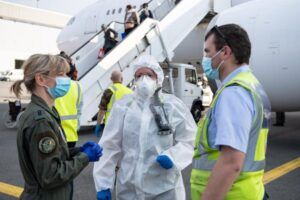From the onset of the coronavirus pandemic, the armed forces of EU Member States have played a critical role in fighting the virus – abroad, at home and in European solidarity. They are providing transport and logistic support, building field hospitals in record time, deploying their medical staff, and supporting national authorities and services. The European External Action Service set up a dedicated task force to support these efforts, in particular by facilitating the exchange of information.
The coronavirus pandemic and its consequences require mobilisation at all levels. As every European is affected either directly or indirectly by the ongoing crisis, many are on the frontlines to contain the virus and tackle its consequences.
Role of the armed forces of EU Member States
The military in Europe are no exception:
- they are supporting our partners abroad and
- working around the clock to support Europeans at home.
As a matter of fact, the armed forces of EU Member States are playing a critical role in supporting European citizens in their respective home countries and across EU Member States, in a spirit of European solidarity. They support national authorities, the health sector and civil protection workers, as well as internal security forces, by providing personnel, material, logistics, transportation – and more.
European External Action Service task force
A dedicated task force was established within the European External Action Service to provide support, in particular by facilitating information exchanges. The task force created a special online platform for EU Member States to share information and best practice of military assistance to civilian authorities, inside the EU, to help the fight against COVID-19 pandemic.
Military assistance against the coronavirus in the EU
In Luxembourg, the national armed forces – with the support of NATO – set up field hospital tents to be ready to boost capacities to treat COVID-19 patients if needed. 130 soldiers from the Luxembourg Armed Forces worked to pack nearly one million masks for workers so they can reopen their businesses while following safety regulations. In the Czech Republic, military personnel from the armed forces built and equipped nine testing sites and have staffed mobile collection teams throughout the country.
In Sweden, volunteer defence organisations are supporting people in risk groups with grocery shopping, transport and other services in several parts of the country. The Swedish Armed Forces have also deployed a military field hospital, provided a medical unit, vehicles, equipment. In Croatia, the military placed beds, electrical generators, tents; set up three mobile medical teams; put a Croatian Air Force helicopter on standby for transporting severely ill COVID-19 patients.
The Belgian Defence has also provided medical equipment, as well as – amongst other things – repatriation flights, disinfection and decontamination teams, material for the homeless to the Red Cross and local authorities, transportation of patients. In France, the French Armed Forces have deployed the so-called ‘’Opération Résilience’’, entirely aimed at supporting the population and public services in the fight against the pandemic.
But this support happens also across the borders of EU Member States. It was an aircraft of the Romanian Air Force that flew 15 Romanian physicians and nurses to Milan from Bucharest in April to support Italian colleagues in their fight against the virus. At the same time, planes and helicopters operated by the German Air Force picked up intensive care patients from France and Italy for treatment in Germany.
The list of examples goes on. All 27 EU Member States have already provided their points of contact in the Ministries of Defence for the information-sharing platform set up by the EEAS task force.







Leave a Reply